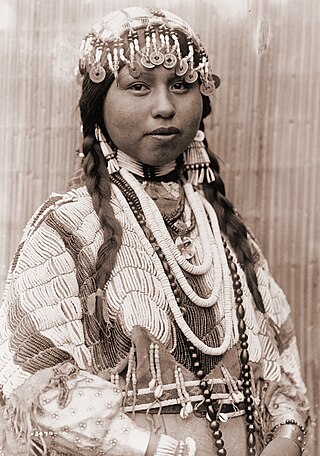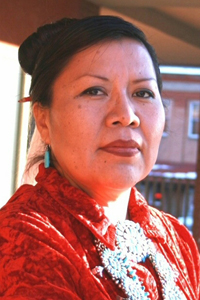
The Yaqui, Hiaki, or Yoeme, are an Indigenous people of Mexico and Native American tribe, who speak the Yaqui language, a Uto-Aztecan language.
Oliphant v. Suquamish Indian Tribe, 435 U.S. 191 (1978), is a United States Supreme Court case deciding that Indian tribal courts have no criminal jurisdiction over non-Indians. The case was decided on March 6, 1978 with a 6–2 majority. The court opinion was written by William Rehnquist, and a dissenting opinion was written by Thurgood Marshall, who was joined by Chief Justice Warren Burger. Justice William J. Brennan did not participate in the decision.

The Bureau of Indian Affairs (BIA), also known as Indian Affairs (IA), is a United States federal agency within the Department of the Interior. It is responsible for implementing federal laws and policies related to Native Americans and Alaska Natives, and administering and managing over 55,700,000 acres (225,000 km2) of reservations held in trust by the U.S. federal government for indigenous tribes. It renders services to roughly 2 million indigenous Americans across 574 federally recognized tribes. The BIA is governed by a director and overseen by the Assistant Secretary for Indian Affairs, who answers to the Secretary of the Interior.
Indigenous peoples of Arizona are the Native American people who currently live or have historically lived in what is now the state of Arizona. There are 22 federally recognized tribes in Arizona, including 17 with reservations that lie entirely within its borders. Reservations make up over a quarter of the state's land area. Arizona has the third largest Native American population of any U.S. state.

An American Indian reservation is an area of land held and governed by a U.S. federal government-recognized Native American tribal nation, whose government is autonomous, subject to regulations passed by the United States Congress and administered by the United States Bureau of Indian Affairs, and not to the U.S. state government in which it is located. Some of the country's 574 federally recognized tribes govern more than one of the 326 Indian reservations in the United States, while some share reservations, and others have no reservation at all. Historical piecemeal land allocations under the Dawes Act facilitated sales to non–Native Americans, resulting in some reservations becoming severely fragmented, with pieces of tribal and privately held land being treated as separate enclaves. This intersection of private and public real estate creates significant administrative, political, and legal difficulties.
State-recognized tribes in the United States are organizations that identify as Native American tribes or heritage groups that do not meet the criteria for federally recognized Indian tribes but have been recognized by a process established under assorted state government laws for varying purposes or by governor's executive orders. State recognition does not dictate whether or not they are recognized as Native American tribes by continually existing tribal nations.

The Standing Rock Reservation lies across the border between North and South Dakota in the United States, and is inhabited by ethnic "Hunkpapa and Sihasapa bands of Lakota Oyate and the Ihunktuwona and Pabaksa bands of the Dakota Oyate," as well as the Hunkpatina Dakota. The Ihanktonwana Dakota are the Upper Yanktonai, part of the collective of Wiciyena. The sixth-largest Native American reservation in land area in the US, Standing Rock includes all of Sioux County, North Dakota, and all of Corson County, South Dakota, plus slivers of northern Dewey and Ziebach counties in South Dakota, along their northern county lines at Highway 20.

The Pascua Yaqui Tribe of Arizona is a federally recognized tribe of Yaqui Native Americans in the state of Arizona.
Indian termination describes United States policies relating to Native Americans from the mid-1940s to the mid-1960s. It was shaped by a series of laws and practices with the intent of assimilating Native Americans into mainstream American society. Cultural assimilation of Native Americans was not new; the belief that indigenous people should abandon their traditional lives and become what the government considered "civilized" had been the basis of policy for centuries. What was new, however, was the sense of urgency that, with or without consent, tribes must be terminated and begin to live "as Americans." To that end, Congress set about ending the special relationship between tribes and the federal government.
Anselmo Valencia Tori was the former chairman of the Pascua Yaqui Association, former vice-chairman of the Pascua Yaqui Tribal Council and Elder of the tribe. Raised in southern Arizona and Rio Yaqui, Mexico, Anselmo adopted his second surname as a young man. ”Tori” is the family’s clan name. His wife was Kathy Ann Nordin. Their marriage took place on April 26, 1992, in Las Vegas, Nevada.
The Cherokee Freedmen controversy was a political and tribal dispute between the Cherokee Nation of Oklahoma and descendants of the Cherokee Freedmen regarding the issue of tribal membership. The controversy had resulted in several legal proceedings between the two parties from the late 20th century to August 2017.

The National Congress of American Indians (NCAI) is an American Indian and Alaska Native rights organization. It was founded in 1944 to represent the tribes and resist U.S. federal government pressure for termination of tribal rights and assimilation of their people. These were in contradiction of their treaty rights and status as sovereign entities. The organization continues to be an association of federally recognized and state-recognized Indian tribes.
Robert A. Williams Jr. is an American lawyer, author, and legal scholar. He works in the fields of federal Indian law, international law, indigenous peoples' rights, critical race and post-colonial theory. Williams teaches at the University of Arizona's James E. Rogers College of Law, serving as Regents Professor, E. Thomas Sullivan Professor of Law and Faculty Chair of the Indigenous Peoples Law and Policy Program.
Lewis Roca Rothgerber Christie is a U.S. law firm with approximately 300 attorneys across ten offices in Arizona, California, Colorado, Nevada, and New Mexico. Its administrative offices are located in Phoenix, where it was founded in 1950 as Lewis & Roca.
United States v. Lara, 541 U.S. 193 (2004), was a United States Supreme Court landmark case which held that both the United States and a Native American (Indian) tribe could prosecute an Indian for the same acts that constituted crimes in both jurisdictions. The Court held that the United States and the tribe were separate sovereigns; therefore, separate tribal and federal prosecutions did not violate the Double Jeopardy Clause.

The Native American peoples of Oregon are the set of Indigenous peoples who have inhabited or who still inhabit the area delineated in today's state of Oregon in the Pacific Northwest region of the United States. While the state of Oregon currently maintains relations with nine federally recognized tribal groups, the state was previously home to a much larger number of autonomous tribal groups, which today either no longer exist or have been absorbed into these larger confederated entities. Six of the nine tribes gained federal recognition in the late 20th century, after undergoing the termination and restoration of their treaty rights starting in the 1950s.

Wendell Chino was an Apache minister known for his defense of tribal sovereignty who served as the leader of the Mescalero Nation for over 40 years. An autocrat and staunch capitalist, Chino fought to improve the reservation's standard of living and foster economic self-sustainability. His policies developed many tribal-owned businesses, including the Ski Apache resort. He is also known to have served as chair of National Congress of American Indians and an associate pastor of the Mescalero Reformed Church for 4 years.

Jamescita Mae Peshlakai is a former Democratic member of the Arizona State Senate, serving from 2017 to 2021. She previously served in the Arizona House of Representatives from 2013 until 2015, and served as co-Minority Whip for the 2018 sitting of the state senate. Peshlakai is a member of the Navajo Nation. She served in the Persian Gulf War. Before her legislative service, Peshlakai provided agricultural outreach to Native Americans on behalf of the USDA.

Marcos Antonio Moreno is an American physician, public health advocate and medical research scholar. He is of Mexican and Native American descent, and an enrolled citizen of the Pascua Yaqui Tribe from the Pascua Yaqui Reservation in southern Arizona. He is a graduate of Cornell University, where he studied Neuroscience, and American Indian Studies. He is the first person from the Pascua Yaqui Reservation to graduate from an Ivy League University, and thus far is the only Doctor of Medicine from the Yaqui's reservation community. He received his Doctor of Medicine degree from UND-School of Medicine and Health Sciences and is a resident physician at Yale University in the Department of Psychiatry.

Veronica Murdock is an American civil servant and of Shasta–Mohave ancestry, as a member of the Colorado River Indian Tribes. She served in the tribal administration, including as vice chair, of the Colorado River Tribe from 1969 to 1979 and between 1977 and 1979 as the first woman president of the National Congress of American Indians. From 1980 to 2004, she served as a civil service employee with the Bureau of Indian Affairs.











